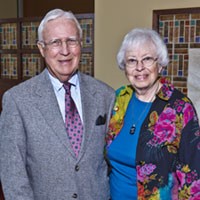Make us a beneficiary of your IRA or other “non-probate” assets
Why beneficiary designations are so powerful
Assets not included in your will are called non-probate assets. Examples are 401(k)s, IRAs, life insurance policies and other accounts. Designating the College of Saint Benedict as a beneficiary can have a big impact and may avoid unwanted taxes for your heirs.

Charitable benefits

Common gifted assets for beneficiaries
- IRA
- 401(k)
- Life insurance
- Joint real estate
- Joint bank accounts
- Joint property ownership
Designate College of Saint Benedict as a beneficiary to one or more of your accounts.
We have partnered with FreeWill to offer this free online platform that will walk you through the process of setting up your beneficiaries. These gifts have a big impact and can often prevent unwanted taxation.
You can impact future generations
Generosity comes in many forms, and it’s often the best way for you to support important causes that matter the most in your life. When you give to the College of Saint Benedict, you help us make a difference.


Ardeth Harth Duthoy ’52 and Everette “Ev” Duthoy ’52’s story
Ardeth (Harth) and Everette “Ev” Duthoy are keen to make solid investment choices. That inclination translates to their commitments to the annual and endowment funds at the College of Saint Benedict, where they believe students not only receive a good education but “instructions for a good life.”
Read moreFrequently Asked Questions
A non-probate asset is an account or other asset that won’t be governed by the decisions you make in a will. Instead, these accounts commonly have an assigned beneficiary that you choose. Types of non-probate assets include many retirement accounts, life insurance, some bank accounts and some assets (like a house or vehicle) that you jointly own with another person.
The most commonly gifted non-probate asset is an IRA or 401(k). This is because these accounts are always taxed (even for people below the estate tax threshold). Giving these accounts to charity keeps your heirs from having to pay unexpected taxes.
Yes! Even if you have a will in place you still need to designate beneficiaries for your non-probate assets.
Yes! Gifts of any size are deeply appreciated. Many people choose to leave a percentage of their estate, which scales up or down with your estate size.
No. You can usually make these easily and at no cost to you.
Yes. You are always free to revise or update your estate plans.
We’re here to help you meet your goals!
Our team would be happy to speak with you in confidence about your giving goals with no obligation.
Name: College of Saint Benedict Planned Giving Office
Title :Tara Maas Tessmer ’14
Schoenecker Commons
37 South College Avenue
St. Joseph, MN 56374
Phone: 320-363-5307
Email: csbplannedgiving@csbsju.edu
Already included us in your estate plan? Let us know
More ways to make an impact
Gifts in a will or trust
Donations in your will or trust are (by far) the most popular type of planned gift. Establishing a will or a trust allows you to plan for the future and take care of the people and causes that you care most about.
Popular tax-smart gifts
Many people are increasingly choosing to give non-cash assets, so they can have a bigger impact at less cost to them.
Gifts that pay you back
Give assets while providing yourself or others with income for a period of time or distributions at a later date.
